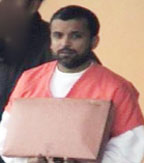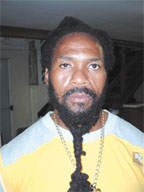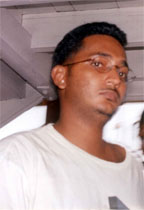 -lawyers say gym owner was supplying guns to Agricola gang
-lawyers say gym owner was supplying guns to Agricola gang
Lawyers representing Guyanese drug accused Roger Khan yesterday opposed a US government motion to admit into evidence “uncharged conduct in Guyana, including two murders” which they said Khan has denied committing and they alleged that one of the two could have been killed because he was supplying guns to an anti-government gang in Agricola.
Disclosures in the US court in New York have riveted the attention of Guyanese and resulted in the local police force on Wednesday formally asking the US government for any information on murders that Khan might have been involved in.
 Robert M. Simels and Diarmuid White, in a 22-page document filed in the New York eastern District Court yesterday and which this newspaper has seen, argue that the “probative value of the proffered evidence is substantially outweighed by the danger of unfair prejudice, confusion of the issues and considerations of waste of time”.
Robert M. Simels and Diarmuid White, in a 22-page document filed in the New York eastern District Court yesterday and which this newspaper has seen, argue that the “probative value of the proffered evidence is substantially outweighed by the danger of unfair prejudice, confusion of the issues and considerations of waste of time”.
The prosecution had filed a motion in limine seeking to have the court admit into evidence in Khan’s trial slated for October, that Khan murdered or caused to have murdered Devendra Persaud and Donald Allison in October 2004 and September 2005, respectively, as well as some 200 other people in Guyana.
The defence argues that introduction of such evidence, based principally on the word of cooperating witnesses with no firsthand knowledge of the murders, would unfairly prejudice Khan and would fundamentally change the tenor and expand the scope of the trial.
It added that Khan would be required to meet the murder allegations in a trial within a trial and to seek the testimony of lay and law enforcement witnesses in Guyana with knowledge of the murders and this would cause confusion of the issues and a waste of time.
 In fact, the defence argued that in its motion, the government acknowledged, for the first time, that certain violent activity involving Khan was “part of a battle among political factions in Guyana,” but contended that Khan also committed violent acts in furtherance of drug trafficking.
In fact, the defence argued that in its motion, the government acknowledged, for the first time, that certain violent activity involving Khan was “part of a battle among political factions in Guyana,” but contended that Khan also committed violent acts in furtherance of drug trafficking.
This shift by the government from its previously stated position that Khan’s involvement in the battle among political factions in Guyana was irrelevant supports “Khan’s consistent position that he is entitled to offer evidence demonstrating that his activities related to the political struggle, not to drug trafficking”, his lawyers said.
The defence lawyers further stated that in the case of Persaud’s murder, they had interviewed a witness who was with Persaud at the time he was killed. They said the witness provided them with the name of the person who shot Persaud—a person with whom the witness was familiar—and the witness stated that it was neither Khan nor anyone associated with Khan.
The defence lawyers said they had investigated and found out that after Persaud returned to Guyana from the United States he had shot an individual and that individual or persons associated with him would have had strong motive to shoot Persaud in retaliation.
In addition, they said, in 1999, “one Butch Fraites (a pilot) was killed in Guyana, and Persaud was arrested for the murder”.
The charges were dismissed, and Persaud moved to the United States. When Persaud returned to Guyana in 2003, friends and associates of Fraites had ample motive to kill Persaud, the lawyers said.
And with regard to the prosecution’s statement that Persaud’s relative had informed him in a consensually recorded telephone call that “Shortie” threatened her and her child at gunpoint, Khan denied participating in any such conduct. They said they would provide substantial evidence at trial that the nickname “Shortie” or “Shortman” was very common in Guyana.
With regard to the Allison murder, the lawyers argued that their investigations had revealed that it was not likely related to narcotics trafficking at all. They said it was because of “his role in supplying firearms to an anti-government gang in the Guyanese town of Agricola that was allied with the anti-government gang in the town of Buxton, which Khan has described in his previous submissions.”
The lawyers submitted that Agricola and Buxton were connected by a common sugar cane field, and gang members transporting arms could pass clandestinely from one town to the other.
Allison, who operated a gym in Agricola, they said, was discovered to have brought large numbers of arms into Agricola in crates labelled as containing boxing equipment, for distribution to the Buxton gang. Therefore, the defence lawyers submitted, the prosecution’s contention that the murder of Allison was narcotics-related could only be based on false information provided by a person, Khan’s political enemy and a supporter of the Buxton criminal gang.
Khan’s lawyers submitted that the US government’s allegations of uncharged murders are based solely on the word of cooperating witnesses and not on any evidence. The lawyers said that as reported in yesterday’s edition of Stabroek News the President of Guyana has stated that Guyana had no information from the United States to substantiate any of the utterances in relation to the unsolved murders attributed by the US government to Khan.
The prosecution had charged in its motion that Persaud had been killed because Khan suspected that he was cooperating with the US government and that Allison’s murder was because he refused to join Khan’s drug organisation and had insulted Khan in public.





